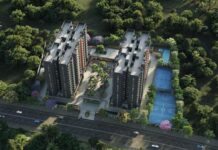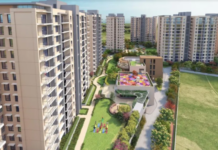New Delhi, February 08, 2018: In its 25th Gathering hung on eighteenth January, 2018, the GST Chamber had made a few imperative suggestions for the Lodging Division which have come into compel with impact from 25th January, 2018. The suggestions are relied upon to advance moderate lodging for the majority in the nation.
One of the critical proposals made is to expand the concessional rate of GST of 12% (viable rate of 8% in the wake of deducting 33% of the sum charged for the house, level and so forth towards the cost of land or unified offer of land, all things considered) in lodging area to development of houses built/obtained under the Credit Connected Sponsorship Plan (CLSS) for Financially Weaker Segments (EWS)/Lower Pay Gathering (LIG)/Center Salary Gathering 1 (MlG-1)/Center Wage Gathering 2 (MlG-2) under the Lodging for All (Urban) Mission/Pradhan Mantri AwasYojana (Urban).
Credit Connected Endowment Plan (CLSS) is one of the parts of Lodging for All (Urban) Mission/Pradhan Mantri Awas Yojana (PMAY) (Urban). Under this segment, endowment would be given on home advances taken by qualified urban poor (EWS/LIG/MIG-I/MIG-II) for securing and development of house. Credit connected endowment would likewise be accessible for lodging advances benefited for new development and for expansion of rooms, kitchen, can and so on, to existing residences as incremental lodging. The cover territory of houses developed under this part of the mission would be up to 30 square meters for EWSA, 60 Square Meters for LIG, 120 sqm for MIG I and 150 Sqm for MIG II. The advantage of Credit Connected Appropriation Plan might be taken by the Temperate Weaker areas or Low/Center Salary Gatherings for buy of houses under any task. The most extreme yearly pay for qualification of recipients under the plan can be dependent upon Rs.18 lakhs. It covers an extensive area of populace which tries to possess a home.
Up until now, houses gained under CLSS pulled in successful GST rate of 18% (powerful GST rate of 12% in the wake of deducting estimation of land). The concessional rate of 12% was pertinent just on houses developed under the other three segments of the Lodging for All (Urban) Mission/Pradhan Mantri AwasYojana (Urban), to be specific (I) ln-situ redevelopment of existing ghettos utilizing land as an asset segment; (ii) Reasonable Lodging in association and (iii) Recipient drove singular house development/upgrade. The exclusion has now been prescribed for houses gained under the CLSS part moreover. In this way, the purchasers would be qualified for intrigue endowment under the Plan also to a lower concessional rate of GST of 8% (successful rate subsequent to deducting estimation of land).
The GST Committee has additionally prescribed that the advantage of concessional rate of GST of 12% (viable GST rate of 8% in the wake of deducting estimation of land) appropriate to houses provided to existing ghetto occupants under the in-situ redevelopment of existing ghettos utilizing land as an asset part of PMAY might be stretched out to houses bought by people other than existing ghetto inhabitants too. This would make the in-situ redevelopment of existing ghettos utilizing land as an asset part of PMAY more alluring to manufacturers and also purchasers.
The third suggestion of the Board is to incorporate houses developed for ‘Monetarily Weaker Segment (EWS)’ under the Reasonable Lodging in organization (PMAY) under the concessional rate of GST of 8% (viable rate in the wake of deducting estimation of land). This will bolster development of houses up to 30 sqm cover region.
The Fourth Proposal of the Committee is to expand the concessional rate of 12% to administrations by method for development of ease houses up to a cover region of 60 sqm in a lodging venture which has been given foundation status under notice No. 13/06/2009 dated 30th Walk, 2009. The said warning of Division of Financial Issues gives foundation status to Reasonable Lodging.
Reasonable Lodging has been characterized in the said notice as a lodging venture utilizing no less than half of the FAR/FSI for abiding units with cover territory of not more than 60 sqm. The suggestion of the Chamber would broaden the concessional rate of 8% GST (in the wake of deducting estimation of land) to development of pads/places of under 60 sqm in ventures other than the tasks secured by any plan of the Focal or State Government moreover.
Notwithstanding the above, keeping in mind the end goal to give a fillip to the lodging and development area, GST Committee has chosen to offer exception to renting of land by Government to Administrative Expert or Government Element. [Government Element is characterized to mean a specialist or board or some other body including a general public, put stock in, organization, (I) set-up by a Demonstration of Parliament or State Lawmaking body; or (ii) set up by any Administration, with at least 90% cooperation by method for value or control, to do any capacity depended by the Focal Government, State Government, UT or a neighborhood authority].
Additionally, any deal/rent/sub-rent of land as a piece of the composite offer of pads has likewise been exempted from GST. In this way, in actuality, the Legislature does not collect GST on supply of land whether by method for deal or rent or sub-rent to the purchaser of pads and truth be told, gives a conclusion because of the estimation of land incorporated into the estimation of pads and just the estimation of level is subjected to GST.
It might be reviewed that all sources of info utilized as a part of and capital products conveyed for development of pads, houses, and so on pull in GST of 18% or 28%. As against this, the vast majority of the lodging ventures in the moderate section in the nation would now pull in GST of 8% (in the wake of deducting estimation of land). Thus, the manufacturer or designer won’t be required to pay GST on the development administration of pads and so on in real money however would have enough ITC (input impose credits) in his books to pay the yield GST, in which case, he ought not recoup any GST payable on the pads from the purchasers. He can recuperate GST from the purchasers of pads just in the event that he recalibrates the cost of the level in the wake of calculating in the full ITC accessible in the GST administration and lessens the ex-GST cost of pads.
The manufacturers/engineers are relied upon to take after the standards set down under Segment 171 of the GST Demonstration circumspectly. The above changes have come into constrain with impact from 25 January 2018.



















